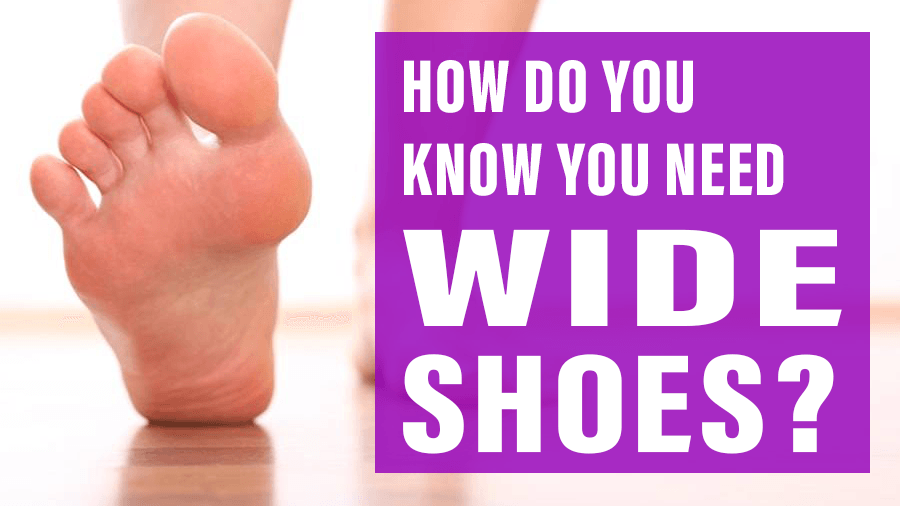So how do you know if you need wide shoes? There are a multitude of signs and symptoms to look for if you’re not sure if you need wide shoes or not. It is important to wear properly fitted shoes; as it is beneficial to your health and to ensure you are comfortable!
4 Reasons You May Need Wide Width Shoes
Neuropathy

First, if you suffer from Neuropathy it’s crucial to your health that you wear properly fitting shoes. When someone suffers from Neuropathy, they have little to no feeling in their feet. If you don’t have the feeling how can you tell if a shoe is rubbing a blister into your foot? A majority of the time you can’t. If a blister or a wound is created and you do not correctly inspect your feet for hot spots (a spot that has been aggravated by friction, but not enough to break the skin) or open wounds caused by friction because of ill-fitting shoes, it can lead to an infection if not treated and caught in time. If you get your feet properly fitted and measured you are decreasing your chances of creating a cut or blister on your feet. Wide width shoes offer the feet breathability and plenty of space so that no areas of your feet are touching the shoe to the point of a blister.
If you suffer from sore, uncomfortable, injured feet or suffer from peripheral neuropathy, the right pair of footwear is essential. Lucky Feet Shoes provide a wide collection of protective, supportive shoes for neuropathy that offers stability and breathability and durability.
Bunions

Bunions can also be a sign that wide shoe is needed. If you wear high heels, pointed toe shoes, overpronate or wear shoes that fit too small can cause a Bunion. A Bunion is a deviation and inflammation of joint where the big toe connects to the 1st metatarsal, the capsule of the joint is displaced, thickened and enlarged, and the cartilage of the joint is damaged. If you form a Bunion and continue to wear ill-fitted shoes, the Bunion will continue to get larger. Fitting a Bunion in a wide shoe, along with proper fitting arch support you are decreasing the chances of it getting any larger and it will also alleviate the pain associated with a Bunion. A proper fitting wide shoe should not rub any portion of your foot, and you should be able to move your toe around the toe box and still have plenty of space.
When you suffer from bunions or some other form of a foot ailment, it is essential that you get yourself the best bunions footwear you can that will afford you the protection, support, comfort and stability you can get.
Calluses and Corns


Any type of friction that can cause a blister, corn or callus is a red flag that more than likely the shoes are too small or narrow for your foot and you need a wide shoe. A callus is caused by consistent friction and pressure, as a defense, your skin creates a hard build up in order to protect the skin from becoming damaged any further. If a callus becomes present it is recommended to get properly fit for wider fitting shoes. Corns are another sign that a shoe is not wide enough. If you see corns present, this is also a key indicator that the shoes you are wearing may be too tight or not deep enough. In conclusion, shoes that are too tight will squeeze the foot, increasing pressure and create the problems listed above.
If you don’t look after your feet, or wear the right footwear, it will only be a matter of time before you start getting problems such as corns, and calluses. So make sure you are about to buy the right shoes for calluses and corns.
Morton’s Neuroma

If you suffer Morton’s Neuroma then you may want to think about changing the width of your shoes. Morton’s neuroma occurs as the nerve passes under the ligament connecting the toe bones (metatarsals) in the forefoot. Morton’s neuroma most frequently develops between the third and fourth toes, usually in response to irritation, trauma or excessive pressure. The incidence of Morton’s neuroma is 8 to 10 times greater in women than in men. Getting fit for a wider shoe can ease the pain of Morton’s Neuroma. Women are more likely to suffer from this because women are prone to wear high heels or pointed toe shoes. Consider being fit for wide shoes, with a wider toe box and proper fitting orthotics. This is another example of why you may need wide shoes.
You need to choose a stiff insole to prevent your feet from flexing if you are suffering from discomfort caused by Morton’s toe. Your choice of an insole has an impact on your feet, legs, and back. Therefore, for the top shoes for Morton’s Neuroma problems, check out our beautiful collection on footwear for foot pain.

Jerick Sobie
Since 2005, I have been a dedicated small business owner specializing in footwear retail. With over 20 years of experience, my business partner and I have helped customers find the perfect shoes that combine style, comfort, and quality. Our expertise extends beyond local sourcing—we have traveled internationally to discover high-quality footwear that meets our customers’ needs. In addition to running my business, I have participated in numerous health fairs and educational seminars, sharing my knowledge on proper footwear and foot health. Committed to providing exceptional service, We carefully curate our selections to ensure the best fit and support for every customer.






















